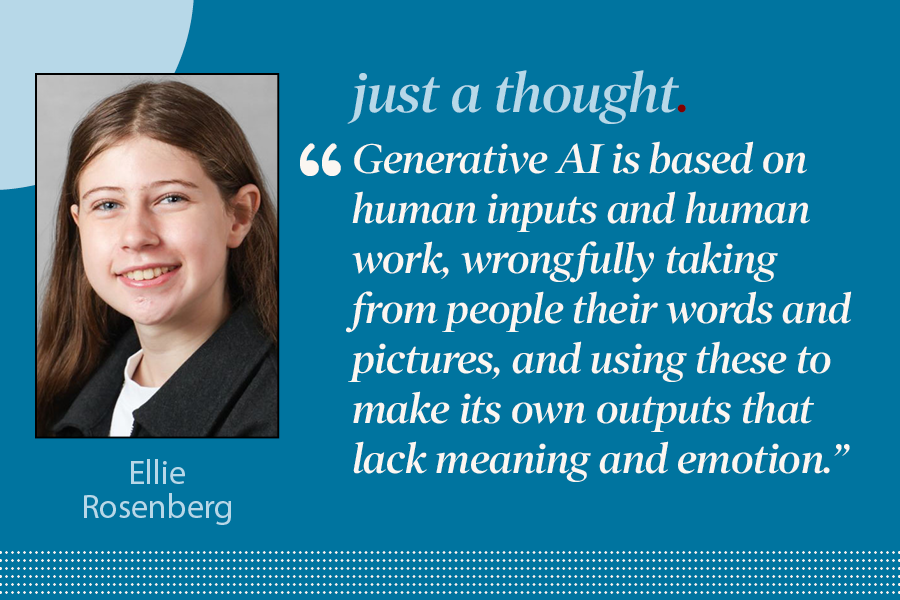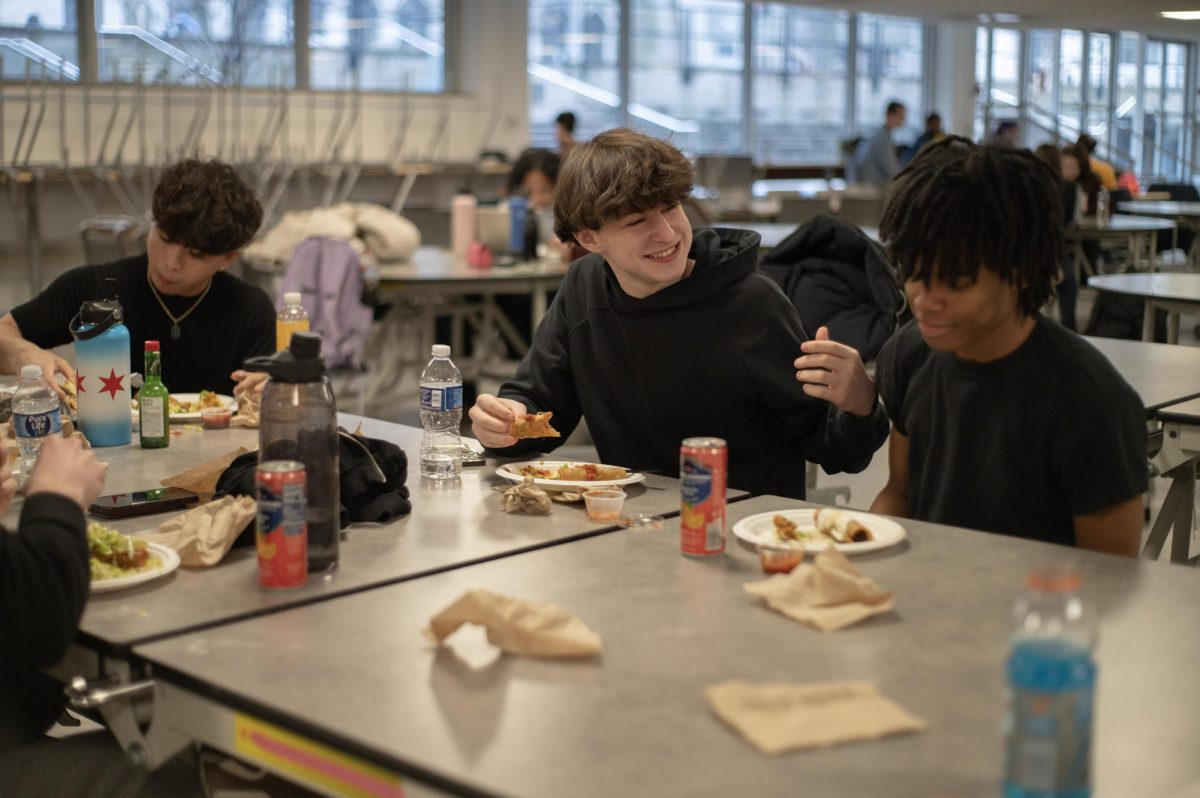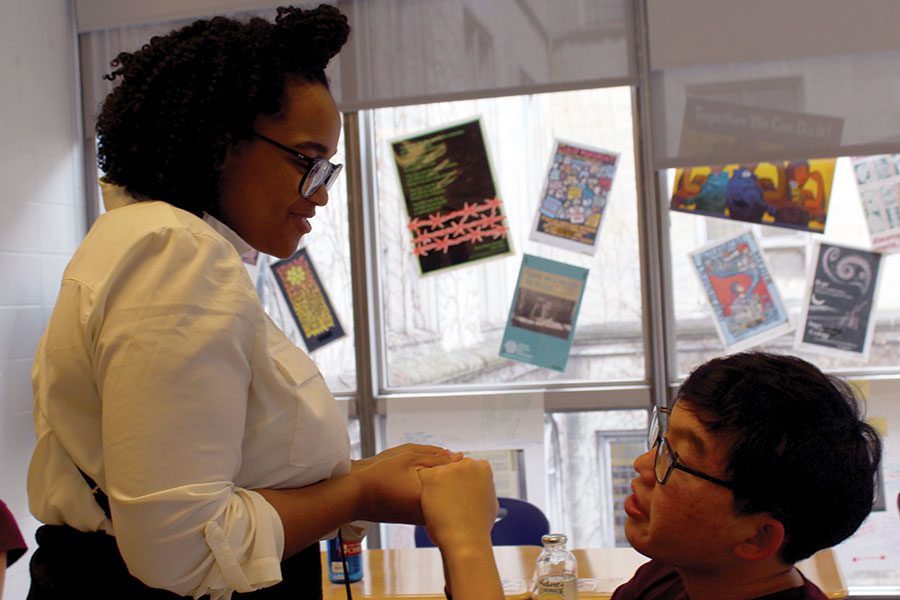LGBT students weigh differing support needs
Spectrum club still serves those seeking network and support
Lily Vag-Urminski
SOCIAL SUPPORT. Junior Destiny Strange holds hands with senior Ryan Lee, supporting him at a Spectrum meeting after a stressful day. At the meeting, students discussed the role of an ally.
December 12, 2018
The results of the health and wellness survey have confirmed what many students have anecdotally suspected: a lot of U-High students are not just attracted to the opposite gender.
But only a few more than a dozen students, mostly freshmen and sophomores, gather in C211 every Friday lunch for Spectrum, U-High’s LGBTQ+ alliance.
Despite the club’s relatively low attendance, Spectrum President Bassem Noghnogh said Spectrum fills a valuable role. From his four years of observation as a member, Bassem said that students who join Spectrum often are younger and looking for affirmation in their identity.
“They’re at a formative place in their lives, and it’s important to help them,” he said. “It’s important to help a lot of these younger kids through these formative experiences. We owe them, because we were given that, or we weren’t given that when we wish we had.”
Senior Ryan Lee joined Spectrum last year and said he was initially drawn to the club to have conversations with people who had similar struggles with sexuality and coming out.
“I really needed Spectrum for my own self-confidence,” Ryan said. “Spectrum needs to be there for people like me — people who only just realized that they are LGBT and now don’t know how to come out to others, how to reconcile their new realizations — because it’s a jarring experience, and when you don’t know who to talk to it can become a painful and stressful environment if not mitigated with conversations.”
Other LGBT students are less interested in a formal support network around sexuality and gender.
Senior Grace Watson said being surrounded by a large population of other LGBT students means that an LGBT identity can become less personally important.
“Being bisexual is in no way a big part of my identity. It defines who I’m romantically interested in, but other than that, it doesn’t define anything about me. I didn’t feel the need to join a club about it,” Grace said. “For me, and a lot the people I’m friends with who are also in the community, it’s not a big part of our identities and it’s not something we’re constantly talking about. We joke about it, but that’s about it.”
Haley Wanner, who said she identifies as queer, said that she has other opportunities to talk about gender and sexuality, in informal settings.
“There are clumps of LGBT people and certain groups where the majority of the group is LGBT, and that, I think, is a reason why someone wouldn’t join Spectrum,” Haley said. “Like, if four of my five closest friends are LGBT, why would I have to go to Spectrum to have those meaningful discussions, when I could have them with my friends in a more comfortable space?”
Daniel Jones, Spectrum’s faculty adviser, said that as more U-High students have identified as LGBT, Spectrum has become a space for students who feel marginalized within the LGBT community.
“For people who don’t feel marginalized, they feel that they don’t need the group or the affinity space. But people who certainly do feel marginalized, do still rely on that social outlet,” Mr. Jones said, adding that Lab still has work to do around education, health and wellness, and mental health issues.
Mr. Jones said it’s not common that people come out as straight.
“For LGBT people, they do have to identify themselves, and there’s mental anguish and anxiety about that,” he said, “and so groups like this still serve that purpose.”
For Ryan, Spectrum served that exact purpose.
“With help from my friends, I came out to both of my sisters, and very recently, I came out to my mother, with great results,” Ryan said. “It stressed me out so much I actually ended up sobbing into my mom’s shoulder after she told me everything was fine and she loved me all the same. I spent nearly half a year terrified that I would never be able to come out, and that, paralyzed with fear, I would just enter a heterosexual relationship and live out my life like that.”
He said the network he built through Spectrum helped.
“That’s why it’s so important that I had so many people to back me up in any situation,” he said. “People to make random gay jokes with to lighten the mood. People to whisper to about crushes and giggle about hot guys with. It helped me normalize what it meant to be LGBT, and accept that I shouldn’t settle for anything less than who I was.”
































































